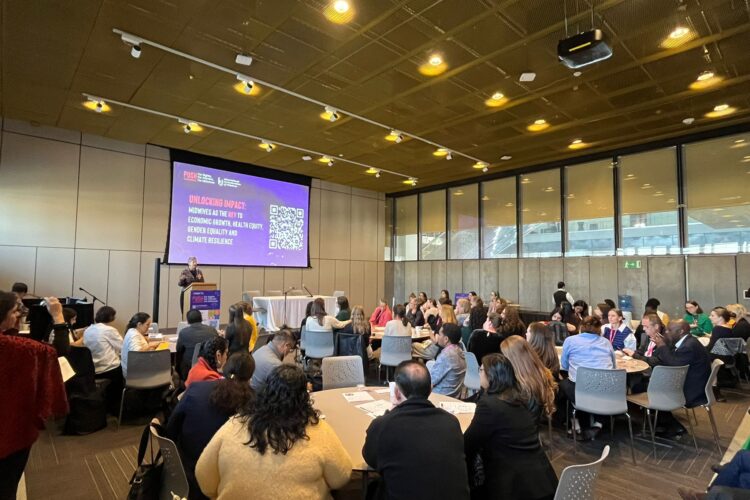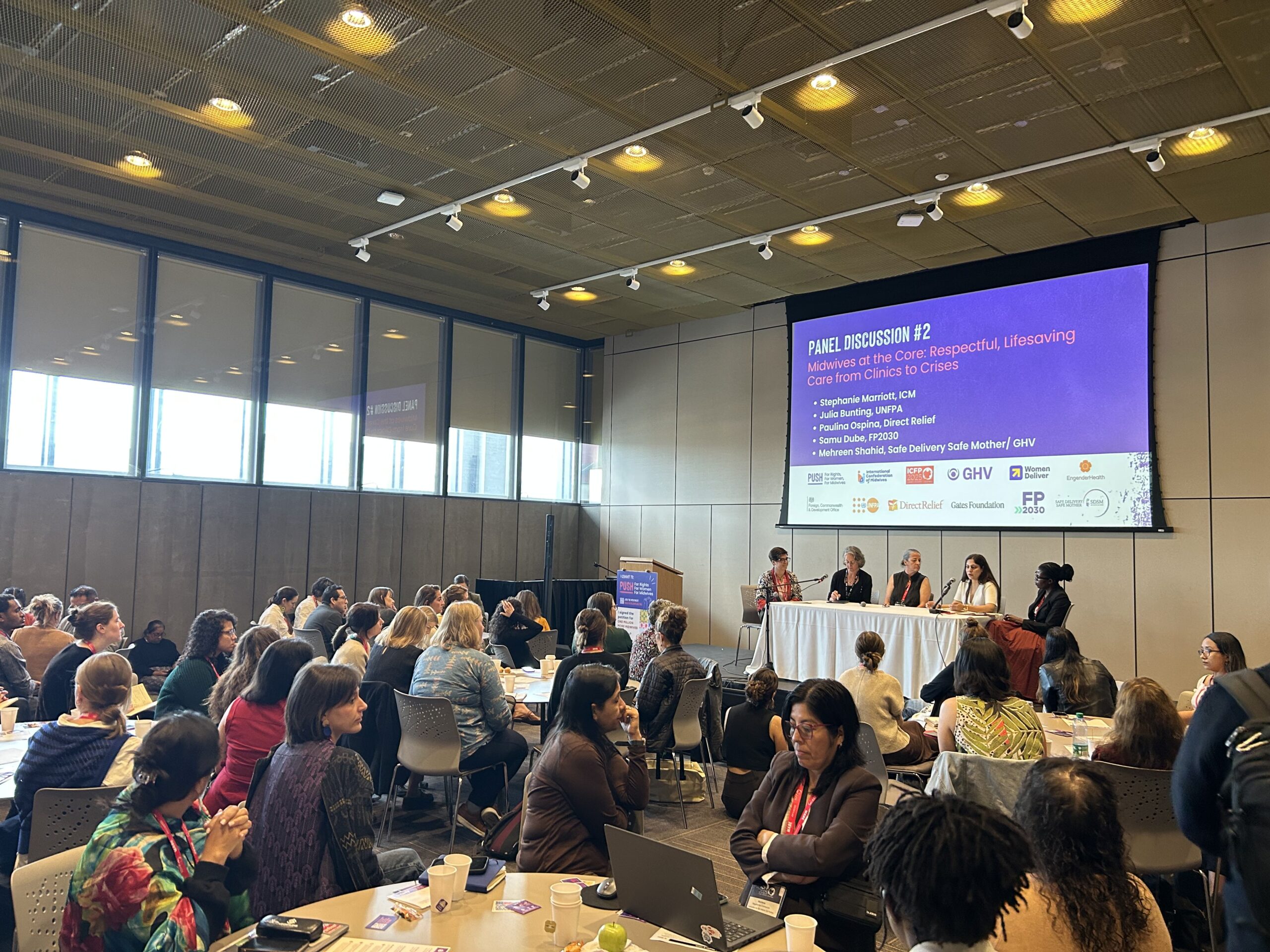Unlocking Impact: Midwives as the Key at ICFP 2025

A packed room at 6:30 am at this year’s International Conference on Family Planning (ICFP), the world’s largest conference on family planning sent a clear message: people want to learn more about midwives and their role in sexual and reproductive health (SRH). Yet, midwives are often missing from the SRH discourse, and from SRH events.
On 04 November 2025, more than 120 participants joined “Unlocking Impact: Midwives as the Key,” an official ICFP side event co-hosted by the PUSH Campaign, ICM’s global advocacy campaign for woman-centred care, and Global Health Visions (GHV). It was the only session in the ICFP agenda with the word “midwives” in the title – and the fact that Room D was full before sunrise showed just how much interest, evidence and energy now sit behind this agenda. It is also a reminder: midwives must be fully included in family planning and SRH discussions, service delivery, and decisions, not treated as an afterthought.
Launching the Unlocking Impact brief
This high-level breakfast marked the launch of a new evidence brief that brings together, in one place, the economic, gender, health and climate cases for investing in midwives and woman-centred care. In a time of converging crises – rising maternal deaths, shrinking civic space, economic pressure and accelerating climate shocks – the brief argues that midwives are one of the smartest, highest-impact investments governments and partners can make.
The session opened with coffee, breakfast and an energising activity led by the ICM team to challenge common myths about what midwives do. Ann Starrs, Consultant, Global Health Visions framed the conversation with a clear call: it is time to move from evidence to action, and to recognise what this movement is really about: “Midwives are the answer and women are the reason.”
Merette Khalil, PUSH Campaign Lead, ICM, then introduced the new brief and its core findings across four domains:
- Economic growth: Midwifery models of care are affordable and cost-effective. Evidence presented in the brief shows that investing in midwives can generate substantial economic returns by closing the women’s health gap, reducing unnecessary interventions and using health resources more efficiently.
- Health equity: Midwives can provide around 90% of essential SRMNAH services and are often the ones reaching rural, marginalised and hard-to-reach communities. Their focus on respectful, rights-based continuity of midwife care supports universal health coverage in practice, not just on paper.
- Gender justice: As a 93% predominantly female profession, investing in midwives helps close gender pay gaps, strengthens women’s leadership and supports bodily autonomy and freedom from violence. Midwives work and advocate with and for women to realise their rights across their life course.
- Climate and crisis resilience: From clinics to crises, midwives deliver lifesaving care when systems are under pressure. Their community-based role, low-resource care models and presence in emergencies make them central to any serious strategy to protect health in a changing climate.
High-level dialogue on four pillars of impact
Two powerful panels translated this evidence into real-world commitments, moderated by ICM’s very own midwife advisor, and one of the few midwives at ICFP, Stephanie Marriott.
 The first panel, “Midwives mean business: Advancing women’s work, wealth, voice and power,” explored how midwives drive both gender justice and economic impact. Paola Salwan Daher, Senior Director of Collective Action at Women Deliver highlighted that “midwives are also the barometer of the strength of health systems,” pointing to the obligation of states to remove the legal barriers midwives face to enable and protect their work. Traci Baird, President and CEO of EngenderHealth underlined that reducing gatekeeping and bringing care closer to women depends on well-supported midwives who can provide comprehensive SRHR services. Victoria Spencer, SRHR Team Lead, of the UK Foreign, Commonwealth and Development Office (FCDO) stressed that, in constrained fiscal environments, midwifery stands out as a cost-effective cornerstone of strong health systems and gender equality. Sanjana Bhardwaj, Deputy Director at the Gates Foundation emphasised that investments in innovation must translate into equipping midwives with the tools, commodities and policy space they need to put those solutions into practice.
The first panel, “Midwives mean business: Advancing women’s work, wealth, voice and power,” explored how midwives drive both gender justice and economic impact. Paola Salwan Daher, Senior Director of Collective Action at Women Deliver highlighted that “midwives are also the barometer of the strength of health systems,” pointing to the obligation of states to remove the legal barriers midwives face to enable and protect their work. Traci Baird, President and CEO of EngenderHealth underlined that reducing gatekeeping and bringing care closer to women depends on well-supported midwives who can provide comprehensive SRHR services. Victoria Spencer, SRHR Team Lead, of the UK Foreign, Commonwealth and Development Office (FCDO) stressed that, in constrained fiscal environments, midwifery stands out as a cost-effective cornerstone of strong health systems and gender equality. Sanjana Bhardwaj, Deputy Director at the Gates Foundation emphasised that investments in innovation must translate into equipping midwives with the tools, commodities and policy space they need to put those solutions into practice.
The second panel, “Midwives at the Core: Respectful, Lifesaving Care from Clinics to Crises,” focused on health systems and climate resilience. Julia Bunting, Director of Programmes Division, UNFPA reaffirmed that midwives are central to UNFPA’s work and described how countries are scaling midwifery education, regulation and deployment, including through the Midwifery Accelerator. Paulina Ospina, Director of Programs at Direct Relief spoke about midwives as trusted partners in humanitarian response and “amazing users of data” who can guide smarter investments. Mehreen Shahid, Founder of Safe Delivery Safe Mother, and Senior Advisor at Global Health Visions shared concrete examples from crisis settings, where properly equipped midwives and local health workers became the only reliable point of care for pregnant women. Samu Dube, Executive Director of FP2030 reminded the room that it is impossible to achieve SRHR for every person or reduce maternal mortality without midwives at the centre.

The need for one million more midwives
Throughout the discussion, one message was consistent across sectors: midwives are not a “nice to have” workforce. They are essential to economic growth, to fair and accessible health systems that can face any crisis, to women’s rights and leadership, and to climate-responsive care. Ana Gutierrez, ICM’s Communications Lead, gave a powerful call to action to a room of newly inspired midwifery advocates welcoming them into the movement.
The packed room, the quality of the discussion, and the strong alignment from gender, health, economic and climate leaders all signalled the same thing: the global community is finally recognising the diverse and essential role of midwives and is joining the call to close the shortage of one million midwives.
Turning momentum into action
Download the Unlocking Impact: Midwives as the Key brief and learn more about how midwives drive economic growth, health equity, gender justice and climate resilience!
Join the PUSH Campaign, the global movement for woman-centred care and midwives, to access a community of advocates and tools to use the evidence brief in your advocacy.
The world needs One Million More Midwives
Sign the petition and help us collect one million signatures to demand one million more midwives — and the investments needed to make it happen.
